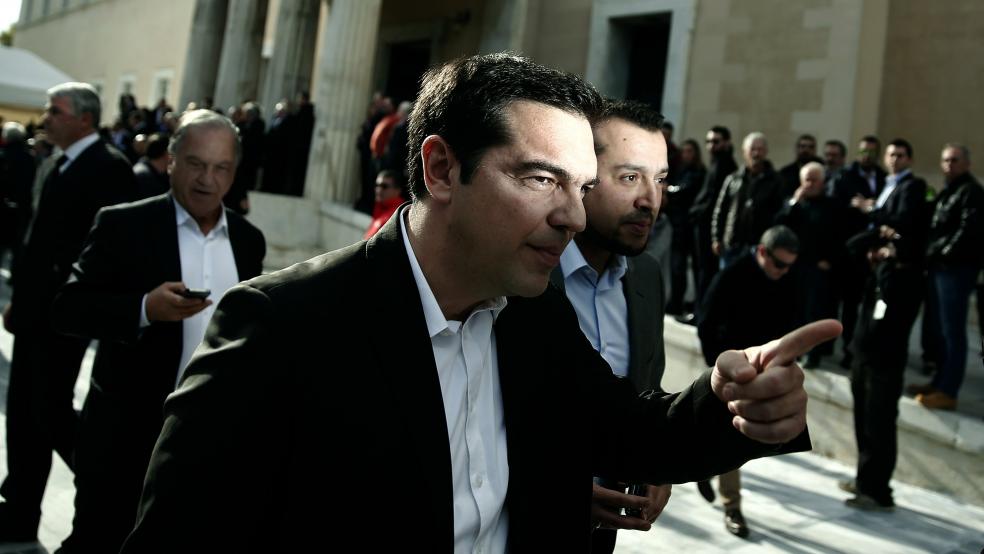ATHENS (Reuters) - Greece heads to an early general election next month after parliament rejected Prime Minister Antonis Samaras's nominee for president on Monday, throwing the country into a new period of political turmoil just as it emerges from economic crisis.
Greek 10-year bond yields surged to a 15-month high and stocks tumbled after former European Commissioner Stavros Dimas fell short of the 180 votes needed to become president in the decisive third round of voting, triggering the dissolution of parliament.Samaras set Jan. 25 as the date for a parliamentary election.Opinion polls point to a victory by the radical leftist Syriza party, which wants to wipe out a big part of the national debt, and cancel the austerity terms of a 240-billion euro ($290 billion) bailout from the European Union and International Monetary Fund that Greece still needs to pay its bills.While most Greeks do not appear to want elections, the terms of the bailout agreed by the Samaras government have imposed harsh sacrifices on many people and the signs of improvement in their battered economy have yet to show through clearly.If Syriza is elected, it would be the first time an anti-bailout party determined to overturn the austerity approach prescribed since the start of the euro zone crisis comes to power in Europe. "With the will of our people, in a few days bailouts tied to austerity will be a thing of the past," Syriza leader Alexis Tsipras said after the vote. "The future has already begun."A defeated Samaras, who gambled and lost by bringing forward the presidential vote by two months, urged Greeks to vote for stability and vowed not to let anyone put Greece's place in Europe in question. The result opens a new chapter of political uncertainty in the euro zone's problem child just as it appeared to be putting the worst of a six-year economic crisis behind it. After nearly crashing out of the euro in 2012, Greece this year returned to economic growth and ended a four-year exile from bond markets. Syriza has held a steady lead in opinion polls for months, although its advantage over Samaras' conservative New Democracy party has narrowed in recent weeks. Weakness among potential coalition partners on both sides could mean that whichever party wins in January will struggle to form a government. Failure to put together a government could leave Greece once again precariously close to a financial crisis since Athens will be without an administration to wrap up a final bailout inspection due to unlock over 7 billion euros in aid. EU/IMF inspectors due to return to Athens in January will now resume discussions on concluding that review after a new government is in place, the IMF said, adding that Greece had no immediate funding needs.Finance Minister Gikas Hardouvelis, who had been negotiating an early exit to the bailout program, said a new government would have to seek an extension to the bailout beyond its end in February. Although Athens had enough cash, it may have to issue more Treasury bills to cover funding needs in March, he said."There will be difficulty in negotiations because we need to have a government," Hardouvelis said.VOLATILE MARKETSUnderlining the potential volatility facing markets, the main Athens stock market index fell as much as 11 percent before paring losses while Greek bond yields jumped above 9 percent. The main banking stocks index fell over 11 percent before recovering."The outcome of the final vote extends the political uncertainty for at least one month," said Theodore Krintas, head of wealth management at Attica Bank in Athens. "One cannot know if the result of early elections will be a viable government."But unlike in 2012, markets elsewhere in Europe were rattled only a little by the latest upheaval in Greece, in a sign of increasing confidence within the euro zone that any contagion will be limited and can be contained.In a bid to reassure markets, Tsipras has sounded more moderate lately, promising to keep Greece in the euro and negotiate an end to the bailout agreement rather than scrap it unilaterally. But he has refused to budge on reversing austerity. Hours after the vote, German Finance Minister Wolfgang Schaeuble warned it would be "difficult" to help Greece if it veered off the path of reform and that any new government must stick to obligations signed up by the previous government.On the streets of Athens, voters were worried that elections would put the sacrifices of the past two and half years at risk and threaten the country's future. Stella Alipranti, 39, who runs a small tourism business, said she was disappointed and saw no advantage in an election."Things won't change just by changing the government because we have foreigners deciding for us," she said. "Having elections every two years certainly doesn't help the country."($1 = 0.8204 euros) (Additional reporting by Angeliki Koutantou and George Georgiopoulos; Writing by James Mackenzie and Deepa Babington; Editing by Giles Elgood)Greece faces early election after PM loses vote on president

© Alkis Konstantinidis / Reuter



